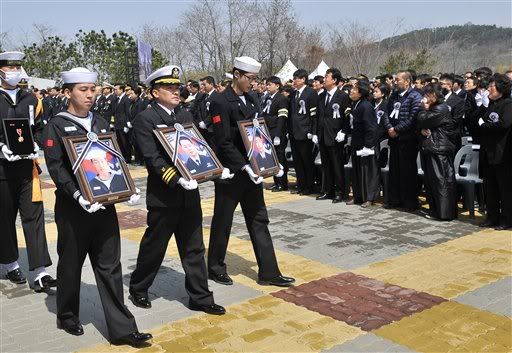
Choi Won-il, 2nd left, captain of the sunken South Korean naval ship Cheonan, and the survivors holding portraits of the victims pass by family members during a funeral ceremony at a navy base at Pyeongtaek, south of Seoul Thursday, April 29, 2010. South Korea honored 46 sailors Thursday with a tearful military funeral a month after a blast sank their warship, and officials vowed retaliation for those responsible as speculation mounted that North Korea may have torpedoed the vessel.
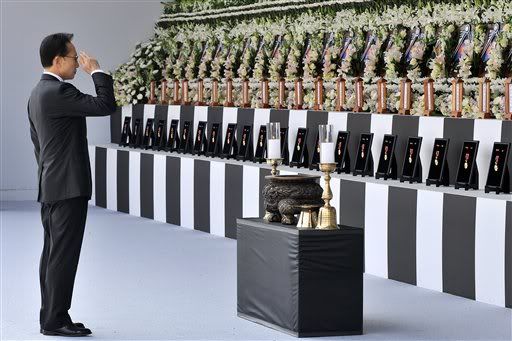
South Korean President Lee Myung-bak salutes in front of portraits of the deceased sailors from the sunken South Korean naval ship Cheonan during a funeral ceremony at a navy base at Pyeongtaek, south of Seoul Thursday, April 29, 2010. South Korea honored 46 sailors Thursday with a tearful military funeral a month after a blast sank their warship, and officials vowed retaliation for those responsible as speculation mounted that North Korea may have torpedoed the vessel.
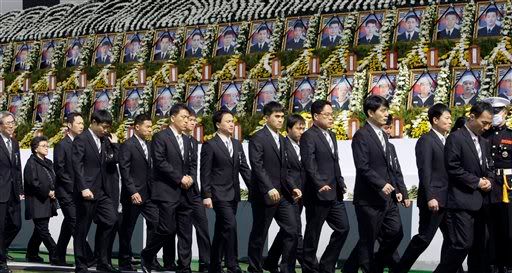
South Korean mourners leave after the memorial ceremony for the deceased sailors from the sunken South Korean naval ship Cheonan during a memorial service at Seoul City Hall Plaza in Seoul, South Korea, Thursday, April 29, 2010. South Korea honored 46 sailors Thursday with a solemn military funeral a month after their warship sank near waters disputed with rival North Korea.
South Korean President Lee Myung-bak held talks with his Chinese counterpart Hu Jintao in Shanghai on Friday that touched on security risks caused by the North's suspected attack on a warship from the South.
China, the reclusive and impoverished North's biggest benefactor with the most influence in Pyongyang, wants to prevent further tensions that increase the chances of war but is not about to punish its neighbor, analysts said.
"The bottom line is that Pyongyang knows that Beijing will not forsake them even if they behave in this provocative manner," said Peter Beck, a specialist in Korean affairs at Stanford University.
Lee, who met Hu on the sidelines of the World Expo in Shanghai, has signaled Seoul will not retaliate with force, calming investor concerns in Asia's fourth largest economy.
"I want to address the tragic loss of your country's warship," Hu told Lee. "To those who died and to their families, please let them know we grieve with them."
South Korea lost 46 sailors when their ship was struck last month by what is believed to be a North Korean torpedo. If confirmed, it would be one of the deadliest strikes by Pyongyang since the end of the 1950-53 Korean War.
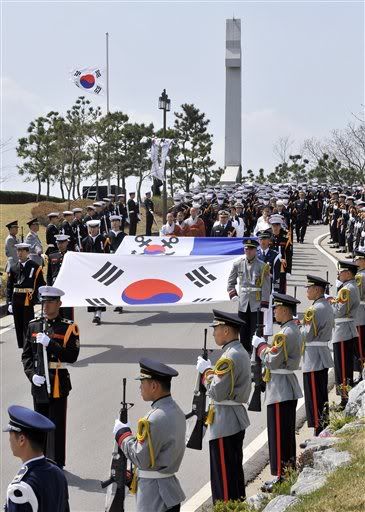
A huge South Korean national flag leads portraits of the victims of the sunken South Korean naval ship Cheonan during a funeral ceremony at a navy base at Pyeongtaek, south of Seoul Thursday, April 29, 2010. South Korea honored 46 sailors Thursday with a tearful military funeral a month after a blast sank their warship, and officials vowed retaliation for those responsible as speculation mounted that North Korea may have torpedoed the vessel.
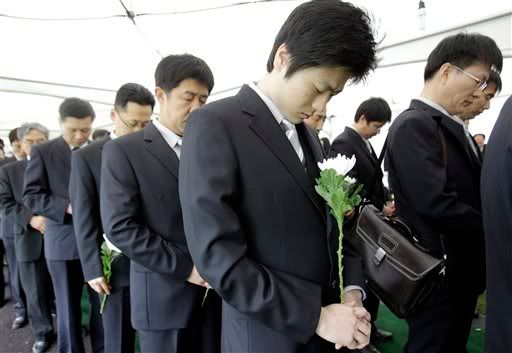
South Korean mourners pay a silent tribute for the deceased sailors from the sunken South Korean naval ship Cheonan during a memorial service held at Seoul City Hall Plaza in Seoul, South Korea, Thursday, April 29, 2010. South Korea honored 46 sailors Thursday with a tearful military funeral a month after a blast sank their warship, and officials vowed retaliation for those responsible as speculation mounted that North Korea may have torpedoed the vessel.
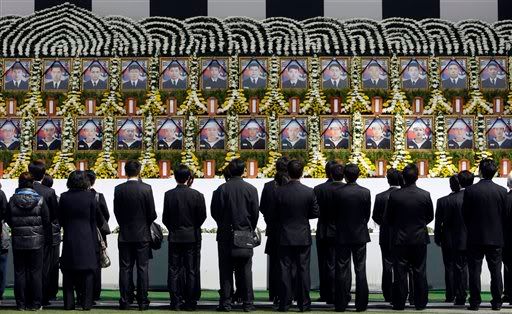
South Korean mourners pay a tribute in front of portraits of the deceased sailors from the sunken South Korean naval ship Cheonan during a memorial service held at Seoul City Hall Plaza in Seoul, South Korea, Thursday, April 29, 2010. South Korea honored 46 sailors Thursday with a tearful military funeral a month after a blast sank their warship, and officials vowed retaliation for those responsible as speculation mounted that North Korea may have torpedoed the vessel.
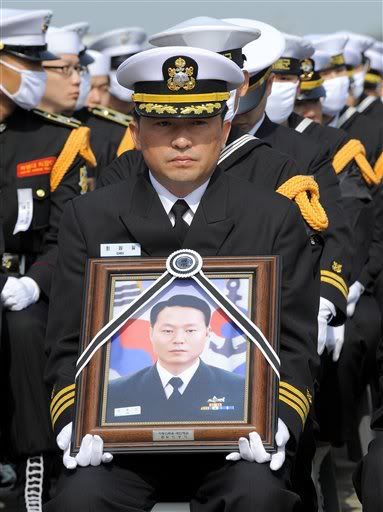
Choi Won-il, captain of the sunken South Korean naval ship Cheonan, holds a portrait of a victim during a funeral ceremony at a navy base at Pyeongtaek, south of Seoul Thursday, April 29, 2010. South Korea honored 46 sailors Thursday with a tearful military funeral a month after a blast sank their warship, and officials vowed retaliation for those responsible as speculation mounted that North Korea may have torpedoed the vessel.
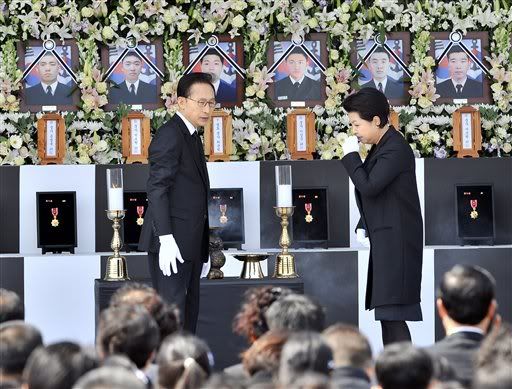
South Korean President Lee Myung-bak and First Lady Kim Yoon-ok express their condolence in front of portraits of the deceased sailors from the sunken South Korean naval ship Cheonan during a funeral ceremony at a navy base at Pyeongtaek, south of Seoul Thursday, April 29, 2010. South Korea honored 46 sailors Thursday with a tearful military funeral a month after a blast sank their warship, and officials vowed retaliation for those responsible as speculation mounted that North Korea may have torpedoed the vessel.
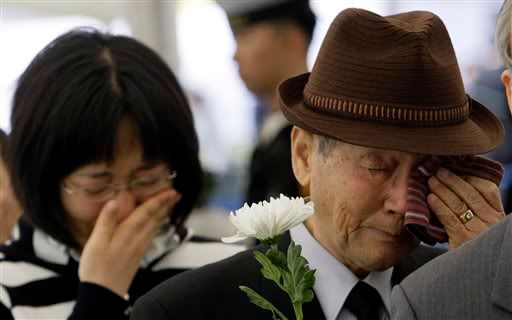
South Koreans weep at the memorial ceremony for the deceased sailors from the sunken South Korean naval ship Cheonan during a memorial service held at Seoul City Hall Plaza in Seoul, South Korea, Thursday, April 29, 2010. South Korea honored 46 sailors Thursday with a solemn military funeral a month after their warship sank near waters disputed with rival North Korea.
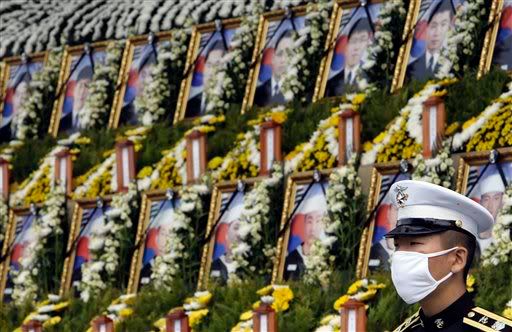
A South Korean honor guard soldier stands in front of portraits of the deceased sailors from the sunken South Korean naval ship Cheonan during a memorial service held at Seoul City Hall Plaza in Seoul, South Korea, Thursday, April 29, 2010. South Korea honored 46 sailors Thursday with a tearful military funeral a month after a blast sank their warship, and officials vowed retaliation for those responsible as speculation mounted that North Korea may have torpedoed the vessel
South Korea's defense minister told parliament that investigators have found a piece of aluminum that appears to be not part of the sunken corvette. Military experts say aluminum debris is consistent with a torpedo attack.
Lee has been looking for regional support in the wake of the crisis, which experts say could result in economic and political moves to punish Pyongyang if Seoul formally names it as the culprit.
Lee may also have his first face-to-face meeting with a top member of the North's ruling class in Shanghai. The North's nominal number 2 leader Kim Yong-nam, who serves as the face of the government, is also attending the Expo.
GOOD NEIGHBOURLY RELATIONS
Both Lee and Kim attended the same welcome dinner hosted by Hu in Shanghai, but were seated far apart and did not appear to speak to each other.
China's official Xinhua news agency quoted Hu as telling Kim earlier in the day that China was willing "to promote good neighborly relations to new heights."
Neither Xinhua, nor a similar report by North Korea's KCNA news agency, made mention of the South Korean ship sinking.
Analysts say Lee's government, which has cut off once lucrative aid to the North and has few economic means left to hurt Pyongyang, risks pushing the North even closer to China if it decides to act tough.
"If the drive to cooperate with China starts producing results, North Korea's policy of ignoring the South will become more blatant, as will its hardline position against the South," said Cho Myung-chul of the Korea Institute for International Economic Policy, who was formerly an academic in the North.
North Korea may also try to raise tensions by resorting to saber rattling, experts have said.
Japan's Asahi newspaper quoted unnamed military sources as saying the North could test fire its mid-range Rodong ballistic missile from its east coast toward Japan some time next month.
The Rodong, with an estimated range of up to 1,400 km (870 miles), can hit all of South Korea and most of Japan. The North is barred from test-firing its missiles by U.N. resolutions.
Sirens blared across South Korea on Thursday as a solemn military funeral honored 46 seamen killed after a blast sank their warship last month. Officials vowed retaliation against those responsible for an attack many believe North Korea launched.
Warships anchored at the base south of Seoul where the funeral was held sounded whistles, and seamen aboard saluted when the vehicles carrying the ashes left for the cemetery.
A somber President Lee Myung-bak and his wife — who joined 2,800 mourners at the ceremony — offered white chrysanthemums, burned incense and bowed before the framed photos of the soldiers, while buglers played taps. Lee, the commander in chief of South Korea's armed forces, then saluted.
Former President Chun Doo-hwan, lawmakers and military leaders also paid respects to those who died in one of South Korea's worst naval disasters.
South Korea has not directly blamed its Cold War-era rival North Korea, but suspicion has focused on Pyongyang given its history of provocations and attacks on the South. South Korea's defense minister said this week the blast was most likely caused by a torpedo attack. North Korea has denied any role.
The name of each sailor was read out while Lee, clad in a black suit and tie, placed military decorations on a giant alter below photos of each man. They had all been posthumously promoted by one rank in recent days.
Buddhist monks clad in orange and white robes chanted prayers at the interfaith funeral. A Roman Catholic priest and a Protestant minister also participated.
"The Cheonan is engraved as history into the people's hearts and your honorable sacrifice is being reborn as patriotism," Chief Petty Officer Kim Hyun-rae, one of the 58 survivors of the disaster, said in an address to the funeral.
Tears welled up in the eyes of President Lee as he listened to Kim's speech.
The sailors went down with the 1,200-ton Cheonan near the tense western sea border with North Korea on March 26 shortly after it was torn apart by what investigators believe was an underwater blast from outside the ship.
The bodies of 40 of the sailors were recovered, while six others remained unaccounted for and are presumed dead.
The Cheonan was on a routine patrol before it split in two and sank near the disputed western sea border, a scene of three bloody sea battles between the rival Koreas that remain locked in a state of war since their 1950-53 conflict ended in a truce instead of a peace treaty.
"We cannot forgive this and must not forgive it and must not forget it," Navy Chief of Staff Kim Sung-chan said in a speech at the funeral. "We will never sit idly against whoever inflicted huge pain to our people. "
Military retaliation against Pyongyang, however, is considered unlikely as it could lead to major conflict and frighten away investors at a time when South Korea is recovering fast from the global financial meltdown and prepares to hold a summit of leaders from the Group of 20 in November.
North Korea has waged a slew of attacks against South Korea, including a 1987 downing of a South Korean passenger plane that killed all 115 people on board, one of the reasons the country is suspected of involvement.
The funeral took place at the 2nd Fleet headquarters in Pyeongtaek, about 45 miles (70 kilometers) south of Seoul, the Cheonan's home base. After the ceremony, the remains were transported by hearse to the national cemetery in the central city of Daejon for burial later Thursday.
About 3,000 white and black balloons were released into the air. Cheonan survivors carried photos of the dead sailors.
Uniformed soldiers lined the streets outside the navy base and saluted when the funeral procession went by.
People at Seoul's main railway station, including uniformed soldiers on leave and traveling home, gathered around television screens to pause in remembrance.
Kim Yong-mi wiped away tears with a handkerchief, her eyes red and watery.
"So many died too young," said Kim, 68. "As someone who's lived all these years more than they ever will, I'm ashamed to be standing here, alive."
Flags in South Korea are flying at half-staff and many government buildings in Seoul have hung large black-and-white placards reading, "We will not forget your honorable sacrifice." An estimated 400,000 people have reportedly visited mourning locations set up across the country to pay respects.






0 comments:
Post a Comment